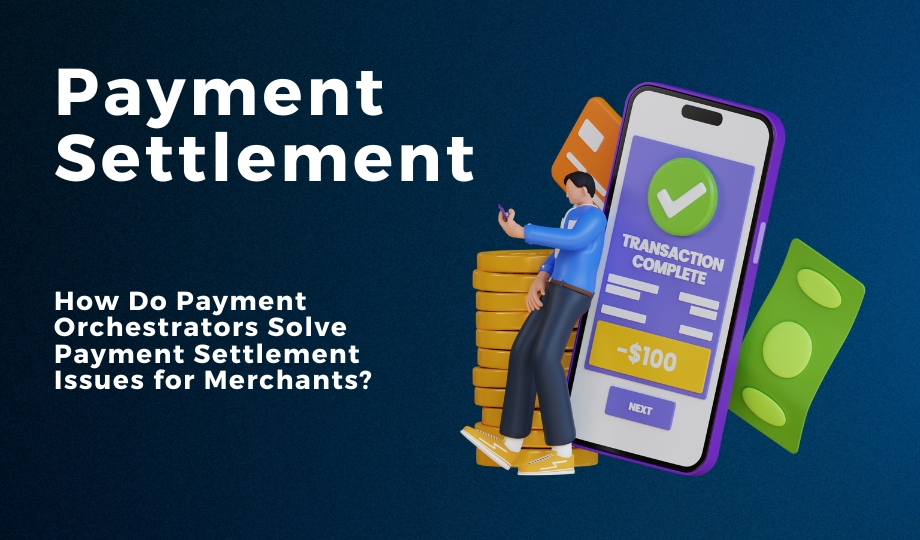If you’re an online merchant who has integrated a payment gateway, you’re likely familiar with the settlement process, where it takes a few days for the money from a sale to appear in your account. While larger enterprises may tolerate this delay, it can pose a significant challenge for small and mid-sized businesses that rely heavily on daily cash flow for their operations.
Late payments can lead to cash flow issues, impacting daily operations and requiring manual invoice reconciliation, which is time-consuming and prone to errors. Fortunately, there’s a solution to address these challenges, and that solution is payment orchestrators.
In this blog, we will explore why payments take time to settle into your account, how the payment settlement process functions, and how payment orchestrators can help you overcome these challenges and other payment-related issues. Read on for a comprehensive understanding.
The Cash Flow Journey: Understanding the Settlement Process
When a customer makes a payment, the money goes through various stages before reaching the merchant’s bank account. This process, known as settlement, involves several steps:
Step 1: A customer visits the merchant’s website and makes a payment using their preferred payment method, such as debit/credit cards, UPI, etc.
Step 2: The payment gateway integrated by the merchant forwards the payment information to the issuing bank and verifies it.
Step 3: If everything is in order, the payment gateway deducts the amount from the customer’s issuing bank and deducts its gateway fee before sending the remaining funds to the merchant’s account.
Step 4: However, the money remains in the merchant’s payment gateway account and not their bank account. The balance is transferred to the merchant’s bank account based on the settlement cycle of the payment gateway.
Payouts: The Flow of Funds to Beneficiaries
Payouts involve the money that businesses pay to suppliers, employees, gig workers for their services, or customers as refunds. It essentially represents the funds that a business owes to various parties. Here’s how payouts work:
Step 1: To facilitate payouts, the merchant requires a payout platform or aggregator like Web Technology Expert that enables payouts. This platform initiates payouts as needed.
Step 2: The settlement amount is debited from the merchant’s account and transferred to the platform’s account.
Step 3: The payout platform offers different payment methods that the merchant can choose based on the recipients.
Step 4: Once the merchant selects the payment method, the platform transfers the payment to the respective beneficiaries.
Step 5: The platform notifies the merchant that the payment has been made to the beneficiary.
Step 6: The merchant informs the customer or gig worker about the payment.
Standard Payment Settlement Duration
The standard payment gateway settlement typically follows a T+2 working day schedule, where T represents the date of payment capture. For example, if a customer makes a payment on June 2, 2023, the funds will be credited to your account on June 4, 2023, based on T+2. However, delays may occur if there are public holidays or weekends in between. For international settlements, it can take T+7 working days.
Instant or real-time settlements are also available from some payment gateways, allowing merchants to access funds within minutes instead of waiting for days.
How Web Technology Expert as a Payment Orchestrator Addresses Payment Settlement Challenges
Payment orchestrators are software solutions that streamline end-to-end payment processes, including authorization, transaction routing, and seamless settlement handling. Here’s how Web Technology Expert, a global payment orchestrator, can help you overcome payment settlement barriers:
Reduced Payment Settlement Time: Web Technology Expert connects you with multiple payment gateways, offering various payment methods to your customers. Depending on the integrated gateways, you can enable faster payment settlement, such as instant or real-time settlement. For example, Razorpay, a payment gateway integrated with Web Technology Expert, offers instant settlements, allowing merchants to access funds within minutes.
Reduced Dependability: Relying solely on a single payment gateway can be limiting. With Web Technology Expert, you can integrate over 50 payment gateways and offer more than 300 payment methods, reducing dependence on a single provider. This flexibility ensures a better customer experience, even if one gateway experiences downtime or doesn’t support specific payment methods.
Transparency in Upcoming Settlements: Web Technology Expert provides end-to-end payment management, allowing you to monitor upcoming settlements. This predictability helps you plan your expenses and manage daily operations without disruptions.
Automated Tasks: With Web Technology Expert, you can automate tasks such as payment reconciliation and invoicing, saving time and reducing errors. The platform’s dashboard offers detailed analytical reports, enabling data-driven decision-making and improved customer experiences.
In addition to speeding up settlement times and accessing funds quickly, payment orchestrators like Web Technology Expert help reduce dependence on a single payment gateway, automate redundant tasks, and provide insights to streamline payment workflows.
Don’t wait; integrate Web Technology Expert into your business, access your cash flow more rapidly, and manage your payments with ease.

